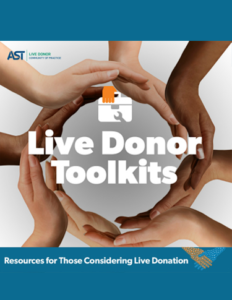
Most parents (or those in need of a kidney transplant) are often reluctant if not strongly opposed to accepting a child’s (or loved one’s) kidney donation. Ironically, adult children and family members already make independent decisions on their own, yet reluctant parents don’t seem to see it that way.
Parents are wired to protect their children. That said, they often feel accepting a kidney from a child is incongruent to their parental oaths and responsibility to keep their loved ones out of harm’s way.
Oddly enough, most parents don’t put themselves in their children’s (or loved one’s) shoes and therefore don’t view their objections as hurtful or harmful.
Parents need to be guided so they can see their opposition to accepting the gift of life from a child is actually hurtful. The hurtful part comes into play when the parent robs the child of joy and psychological gain, which they’d receive from helping a beloved parent live a better and longer life.
To balance perceptions, create a reverse scenario for the parent to ponder. Ask the parent if they’d ever consider donating a kidney to their mother or father if they were in need. Chances are, you’ll hear a resounding “Of course, I would!”
When this is the case, present 2 follow-up questions:
- How would you feel if your mother or father disallowed you from trying to save their life?
- Could you live with the memory of being prohibited from saving, enhancing or extending your parent’s life?
Putting the shoe on the other foot often allows parents to reframe their need to dishonor their child’s wishes. And, while protecting a child’s medical safety by prohibiting donation, it actually hurts their emotional and physiological health for years to come.
Let’s face it. The child wasn’t asking for approval. They were simply stepping up to serve. Their desire to help is merely a reflection of the loving values their parents taught them –family first, always.
We often forget that the gift in giving is not in the receiving, but rather the joy one receives from the giving. No one should have the power to take that away from the giver.
Donors have said, “If my recipient refused my offer, I’d be robbed of a blessing.” It’s not the receiver’s call to accept or decline. That’s the transplant centers’ job.
So, the next time you hear a parent in need of a kidney transplant refuse to accept one of their children as a potential donor—or anyone refuse to accept a kidney from a loved one—read this article to them, or better yet, print it off and hand it over with endearing smile.
Author: Risa Simon, 2010 (live-donor) preemptive kidney transplant recipient, motivational speaker, inspirational author, patient mentor/advocate and founder/CEO of Simon Says Seminars, inc., TransplantFirst Academy, TransplantStrong, and the Donor-Seeker® Program. For more information contact: risa@transplantstrong.com or visit: www.TransplantStrong.com




